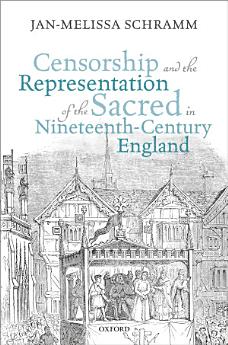Censorship and the Representation of the Sacred in Nineteenth-Century England
May 2019 · Oxford University Press
Ebook
304
Pages
family_home
Eligible
info
reportRatings and reviews aren’t verified Learn More
About this ebook
Throughout the nineteenth century, the performance of sacred drama on the English public stage was prohibited by law and custom left over from the Reformation: successive Examiners of Plays, under the control of the Lord Chamberlain's Office, censored and suppressed both devotional and blasphemous plays alike. Whilst the Biblical sublime found expression in the visual arts, the epic, and the oratorio, nineteenth-century spoken drama remained secular by force of precedent and law. The maintenance of this ban was underpinned by Protestant anxieties about bodily performance, impersonation, and the power of the image that persisted long after the Reformation, and that were in fact bolstered by the return of Catholicism to public prominence after the passage of the Catholic Relief Act in 1829 and the restoration of the Catholic Archbishoprics in 1850. But even as anti-Catholic prejudice at mid-century reached new heights, the turn towards medievalism in the visual arts, antiquarianism in literary history, and the 'popular' in constitutional reform placed England's pre- Reformation past at the centre of debates about the uses of the public stage and the functions of a truly national drama. This book explores the recovery of the texts of the extant mystery-play cycles undertaken by antiquarians in the early nineteenth century and the eventual return of sacred drama to English public theatres at the start of the twentieth century. Consequently, law, literature, politics, and theatre history are brought into conversation with one another in order to illuminate the history of sacred drama and Protestant ant-theatricalism in England in the long nineteenth-century.
About the author
Jan-Melissa Schramm worked as a lawyer in private practice before undertaking a PhD in English Literature. She is a University Lecturer in Nineteenth-Century Literature at the University of Cambridge, a Fellow in English at Trinity Hall, Cambridge, and Deputy Director of the Cambridge Centre for Research in the Arts, Social Sciences, and Humanities (CRASSH). She is the author of two monographs to date, Testimony and Advocacy in Victorian Law, Literature, and Theology (Cambridge University Press, 2000) and Atonement and Self-Sacrifice in Nineteenth-Century Narrative (Cambridge University Press, 2012), and she is co-editor of two volumes of essays, Fictions of Knowledge: Fact, Evidence, Doubt (Macmillan, 2011) and Sacrifice and Modern War Literature (Oxford University Press, 2018).
Rate this ebook
Tell us what you think.
Reading information
Smartphones and tablets
Install the Google Play Books app for Android and iPad/iPhone. It syncs automatically with your account and allows you to read online or offline wherever you are.
Laptops and computers
You can listen to audiobooks purchased on Google Play using your computer's web browser.
eReaders and other devices
To read on e-ink devices like Kobo eReaders, you'll need to download a file and transfer it to your device. Follow the detailed Help Center instructions to transfer the files to supported eReaders.





